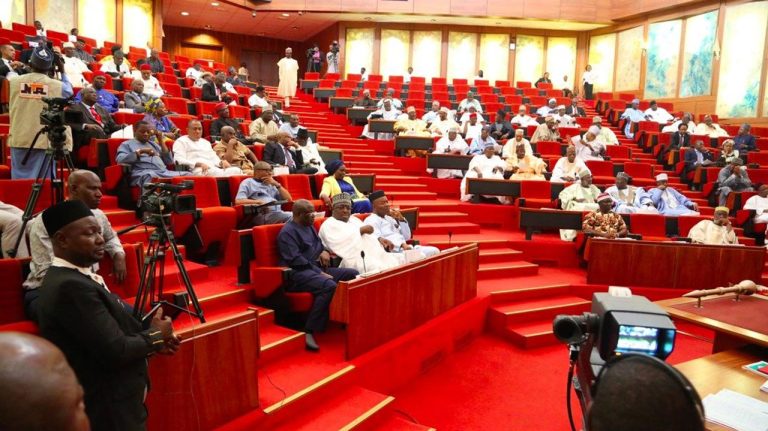The Senate has advanced a bill aimed at establishing the National Assembly Budget and Research Office (NABRO).
Sponsored by Deputy President of the Senate, Jibrin Barau (APC, Kano North), the proposed legislation, formally known as “A Bill for an Act to establish the National Assembly Budget and Research Office which provides the National Assembly with objective, timely and non-partisan analysis needed for economic and budget decisions and for related matters, 2024 (SB.363),” seeks to usher in a new era of informed policymaking within Nigeria’s legislative framework.
Introduced by Senator Opeyemi Bamidele (APC, Ekiti Central) on behalf of Senator Barau, who was presiding over the session, the bill envisions the creation of an autonomous entity dedicated to furnishing the National Assembly with detailed and impartial fiscal analysis and budgetary insights.
This initiative is aimed at fortifying the legislative body with the necessary tools to make enlightened economic and budgetary decisions, thereby enhancing the government’s accountability and the effectiveness of public spending.
- Leading the debate, Bamidele said the bill aims “to provide the National Assembly with objective, timely and nonpartisan analysis, information and estimates needed for economic and budget decisions to provide independent unbiased and nonpartisan analysis of this every phenomenon of government budget estimate.
- “To provide independent and continuous review and monitoring of existing and proposed programmes and budgets for the federal government.
- “To provide analysis of the economic implications of the federal budget on the private sector and the budgetary and financial implication of any proposed legislation, when so required by any Committee of the National Assembly.”
Echoing the sentiment, Senator Solomon Olamilekan (APC, Ogun West) highlighted the establishment of NABRO as a critical step in aligning Nigeria’s budgetary practices with international standards, emphasizing the office’s role in providing a comprehensive review of budgetary documents.
The discussion also touched upon the imperative need to amend the bill’s title to include the term “Independent,” a suggestion put forth by Senator Seriake Dickson (PDP, Bayelsa), to emphasize the fundamental importance of the office’s autonomy in its operations and analyses.
Senator Ahmad Lawan (APC, Yobe North) articulated the broader implications of the bill, suggesting that its enactment by President Bola Tinubu would empower the National Assembly to fulfil its legislative duties more effectively, leveraging enhanced authority in budgetary approvals to ensure responsible and judicious use of resources.
Concern about more financial costs
Despite overwhelming backing, concerns were raised by Senator Adams Oshiomhole (APC, Edo North) regarding the potential financial burden the new office might impose on the nation’s governance expenses.
These apprehensions, however, did not deter the bill’s progression, as it successfully cleared a voice vote, led by Senator Barau, and was referred to the Committee on Appropriations for further deliberation, with expectations for a comprehensive review within two weeks.
More Insights
- The Senate’s initiative to establish the National Assembly Budget and Research Office (NABRO) through the new bill may introduce a second budgetary body, juxtaposed with the existing Budget Office of the Federation. This legislative move unfolds against the backdrop of President Bola Tinubu’s directive to fully implement the Oronsaye report—a comprehensive blueprint for public sector reforms aimed at streamlining government operations and reducing the fiscal footprint of governance.
- The Oronsaye report, a thorough examination of the public sector’s architecture, recommended the consolidation, dissolution, or reconfiguration of various governmental bodies to curb the burgeoning costs of administration.
- Initially submitted during the Goodluck Jonathan presidency in 2012, the report’s recommendations have lingered through administrations, with a white paper released in 2014 and a subsequent reevaluation under Muhammadu Buhari’s tenure, culminating in a second white paper in August 2022. Despite these steps, the report’s proposals remained largely unimplemented until President Tinubu’s recent commitment to address the longstanding issue of inflated governance expenses.
- In a decisive stride towards implementing these reforms, the Tinubu administration has instituted an eight-member committee, tasked with a 12-week mandate to navigate the legislative and administrative hurdles necessary for the report’s recommendations to take effect. This committee is expected to orchestrate a comprehensive overhaul of the public sector’s organizational structure, in line with the report’s vision for a leaner, more efficient government.

